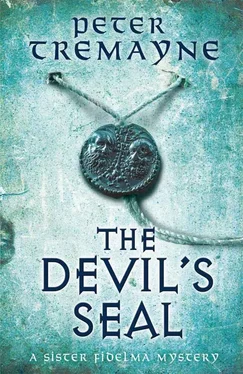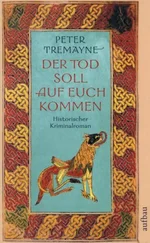Peter Tremayne - The Devil's seal
Здесь есть возможность читать онлайн «Peter Tremayne - The Devil's seal» весь текст электронной книги совершенно бесплатно (целиком полную версию без сокращений). В некоторых случаях можно слушать аудио, скачать через торрент в формате fb2 и присутствует краткое содержание. Год выпуска: 2014, ISBN: 2014, Издательство: Hachette UK, Жанр: Исторический детектив, на английском языке. Описание произведения, (предисловие) а так же отзывы посетителей доступны на портале библиотеки ЛибКат.
- Название:The Devil's seal
- Автор:
- Издательство:Hachette UK
- Жанр:
- Год:2014
- ISBN:9781472208330
- Рейтинг книги:3 / 5. Голосов: 1
-
Избранное:Добавить в избранное
- Отзывы:
-
Ваша оценка:
- 60
- 1
- 2
- 3
- 4
- 5
The Devil's seal: краткое содержание, описание и аннотация
Предлагаем к чтению аннотацию, описание, краткое содержание или предисловие (зависит от того, что написал сам автор книги «The Devil's seal»). Если вы не нашли необходимую информацию о книге — напишите в комментариях, мы постараемся отыскать её.
The Devil's seal — читать онлайн бесплатно полную книгу (весь текст) целиком
Ниже представлен текст книги, разбитый по страницам. Система сохранения места последней прочитанной страницы, позволяет с удобством читать онлайн бесплатно книгу «The Devil's seal», без необходимости каждый раз заново искать на чём Вы остановились. Поставьте закладку, и сможете в любой момент перейти на страницу, на которой закончили чтение.
Интервал:
Закладка:
The girl started. ‘Does it show that much?’
‘It does.’
Sister Dianaimh sighed. ‘Then there is no use denying it.’
‘Any particular reason?’
‘I did not enjoy my time in the Abbey of Laestingau. I don’t like the men of Mercia that I encountered.’
‘Is that all?’
‘What else should there be?’
‘Why did you go to Oswy’s Kingdom? Were you Abbess Líoch’s companion then?’
The girl shook her head. ‘I only met her when I went to Laestingau. That was after the Great Debate at Streonshalh at which I understand you and Fidelma were present.’
‘What made you go to Laestingau?’
‘In spite of the decision of Oswy to follow Rome, which caused many of the missionaries of our land to return home, small bands of teachers continued to go to the kingdoms of the Angles and Saxons, to convert and teach. I was one of a small band.’
‘From what abbey did you join them?’
‘I served at the Abbey of Sléibhte.’
‘Ah yes, I remember. That is beyond Osraige Territory, isn’t it?’
‘It is in Uí Dróna territory,’ confirmed the girl. ‘Fiacc, son of MacDara, Prince of the Uí Bairrche, being converted to the New Faith before Patricius came to this land, founded it. The Uí Bairrche once ruled Laighin before the Uí Cennselaig overthrew them.’
‘Who is the abbot there now?’
‘Aéd of the Uí Bairrche. The abbey is regarded as an Uí Bairrche stronghold; it gets scant recognition from King Fianamail of Laighin who, of course, is descended from the Uí Cennselaig. Therefore, there were tensions there. That was when I decided to join the small band of pilgrims going to Laestingau.’
‘And is that where you met Abbess Líoch?’
‘Yes, although she was not an abbess then. It was after she returned here and went to Cill Náile that she became Abbess. She asked me to join her and I became her bann-mhaor , her female steward.’
Eadulf decided to seize the opportunity to press the question that still puzzled him and Fidelma. ‘What I cannot understand is why Brother Cerdic especially asked for Abbess Líoch to attend here. The Venerable Verax tells us that they are only investigating claims for recognition of an Archbishop over the Five Kingdoms. If so, what role would the Abbess of Cill Náile play?’
‘I would not know.’ The girl looked uncomfortable.
‘I presume Cill Náile isn’t claiming to be regarded as a primacy?’ he joked.
Sister Dainaimh looked startled for a moment and then realised that Eadulf was not serious so did not reply.
At that moment Brother Madagan joined them and made an excuse to draw Sister Dainaimh aside to talk to her while Eadulf went to look for Fidelma. She was seated talking with Abbess Líoch. He wondered if they had made up after their previous argument. Fidelma welcomed him with a smile.
‘We were just talking about Brother Cerdic,’ she commented, as he obeyed her gesture to sit down.
‘What about him?’
‘I was telling Fidelma that I am still no wiser as to why he wanted me to come here,’ the abbess explained. ‘There is nothing that these visitors have raised which is of any interest to me.’
‘I must admit that it is strange, if we are to believe what the Venerable Verax tells us is the purpose of this deputation,’ Fidelma agreed.
‘You have reason not to believe it?’ asked the abbess.
‘When Brother Cerdic came to Cill Náile to ask you to come here, how exactly did he phrase the request?’ Fidelma enquired, ignoring her question.
‘Just as I have told you. He said it would “be in my interest” to come.’
‘And that was it?’
‘Yes. But as I said, I have heard nothing that is in my interest so far.’
‘I was speaking to Sister Dianaimh a moment ago,’ Eadulf said. ‘I had not realised that she had been at Laestingau with you. I wondered whether she had encountered Brother Cerdic before?’
The abbess shook her head quickly. ‘No — she would have told me. She came to Laestingau some time after the attack on that abbey. I had not known her before. I think you are aware that she came from the Abbey of Sléibhte?’
Fidelma sighed deeply. ‘It is just hard to understand why Brother Cerdic would ask you to come here.’
Eadulf chuckled. ‘Well, as I said to Sister Dainaimh, it is not as if Cill Náile would be one of those places to claim authority over all the other abbeys in the Five Kingdoms.’
‘A silly idea,’ the abbess replied, taking him seriously. ‘Our churches are independent; they look to the protection of the kings and princes of the territory, and not to some over-lordship within the religious. Why, that would mean the religious themselves would be creating bishops and abbots who saw themselves as temporal princes. Next thing, they would be raising their own armies to protect their abbeys, which then became fortresses. We would have to start paying tribute to bishops instead of to kings.’
The abbess then excused herself, rose and moved off. Eadulf watched her go with a troubled expression. ‘There must have been some purpose in the mind of Brother Cerdic,’ he observed quietly.
‘I saw you talking with Bishop Arwald,’ Fidelma remarked. ‘Did he say anything further that might cast a light on the matter?’
‘He did not. He seemed to want reassurance that Abbot Ségdae was not interested in obtaining approval from Rome for claiming the primacy for Imleach.’
‘How curious. I thought Abbot Ségdae had made himself clear earlier.’
‘Do I hear my name mentioned?’
They turned to find Abbot Ségdae about to join them. He sat down.
‘We were speaking about our strange visitors and their purpose,’ explained Fidelma.
‘A strange deputation, indeed,’ confirmed the abbot. ‘I would feel better if I could understand why their emissary, Brother Cerdic, had been killed. That alone makes their mission perplexing.’
Eadulf glanced at Fidelma, wondering whether to mention the links with the attack on the Venerable Victricius and his brother. She had obviously decided the time was not right.
‘If I had been charged with such a mission,’ continued the abbot, ‘I would have gone first to the Kingdom of Midhe, to the seat of the High King himself, and then called a council of the chief bishops of all the Five Kingdoms and let each put forward their arguments. But this seems such a surreptitious means of sounding us all out. First to Laighin, then to Muman — and then where? Presumably to Connachta?’
Eadulf saw a certain expression on Fidelma’s face which meant that the abbot had said something of importance. It was a fleeting expression that Eadulf knew well and which perhaps only he could interpret: the droop of the eye, the muscle twitching at the corner of her mouth.
‘Deogaire did warn us,’ Eadulf smiled, thinking to deflect the topic. ‘Remember the night of Cerdic’s funeral? You said something to Brother Madagan about the dangers of prophecy.’
Abbot Ségdae actually chuckled. ‘My steward claimed to be having dreams. Some silly notion of digging up the tomb of the Blessed Ailbhe who founded our abbey.’
‘Brother Madgan is usually such a phlegmatic person,’ observed Fidelma. ‘For what purpose does he dream of digging up Ailbhe’s tomb?
‘He said, in his dream, the tomb would reveal that the Abbey of Imleach’s destiny was to become the greatest centre of the Faith in the Five Kingdoms. He believed it was a prophecy. After Deogaire’s outburst, I remarked to Madagan that soothsayers and prophets are not taken seriously. Ah, I want a word with Bishop Arwald. Excuse me.’
Fidelma turned to Eadulf and motioned him aside, then murmured, ‘Talk to the Venerable Verax and try to ask him why he was in Canterbury and what the purpose of his journey was. Would the Bishop of Rome really send his own brother on such a journey to our kingdom, merely to hear gossip? I believe there is a deeper purpose at work and that it has something to do with Canterbury.’
Читать дальшеИнтервал:
Закладка:
Похожие книги на «The Devil's seal»
Представляем Вашему вниманию похожие книги на «The Devil's seal» списком для выбора. Мы отобрали схожую по названию и смыслу литературу в надежде предоставить читателям больше вариантов отыскать новые, интересные, ещё непрочитанные произведения.
Обсуждение, отзывы о книге «The Devil's seal» и просто собственные мнения читателей. Оставьте ваши комментарии, напишите, что Вы думаете о произведении, его смысле или главных героях. Укажите что конкретно понравилось, а что нет, и почему Вы так считаете.











